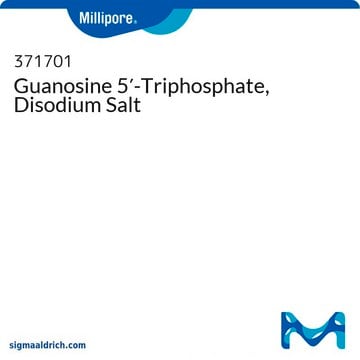G8877
Guanosine 5′-triphosphate sodium salt hydrate
≥95% (HPLC), powder
Synonym(s):
GTP
About This Item
Recommended Products
Quality Level
Assay
≥95% (HPLC)
form
powder
color
white
solubility
H2O: 50 mg/mL
shipped in
dry ice
storage temp.
−20°C
SMILES string
[Na+].[Na+].[Na+].NC1=Nc2c(ncn2[C@@H]3O[C@H](COP(O)(=O)OP([O-])(=O)OP([O-])([O-])=O)[C@@H](O)[C@H]3O)C(=O)N1
InChI
1S/C10H16N5O14P3.3Na/c11-10-13-7-4(8(18)14-10)12-2-15(7)9-6(17)5(16)3(27-9)1-26-31(22,23)29-32(24,25)28-30(19,20)21;;;/h2-3,5-6,9,16-17H,1H2,(H,22,23)(H,24,25)(H2,19,20,21)(H3,11,13,14,18);;;/q;3*+1/p-3/t3-,5-,6-,9-;;;/m1.../s1
InChI key
KZRMTEVIDYXWQW-CYCLDIHTSA-K
Gene Information
human ... HRAS(3265)
Looking for similar products? Visit Product Comparison Guide
Related Categories
Application
- in the preparation of horseradish peroxidase (HRP)-modified platination reagents
- in whole cell, voltage-clamp recordings
- in in vitro inhibition of transglutaminase (tTG)
Biochem/physiol Actions
Features and Benefits
Preparation Note
Storage Class Code
11 - Combustible Solids
WGK
WGK 3
Flash Point(F)
Not applicable
Flash Point(C)
Not applicable
Personal Protective Equipment
Certificates of Analysis (COA)
Search for Certificates of Analysis (COA) by entering the products Lot/Batch Number. Lot and Batch Numbers can be found on a product’s label following the words ‘Lot’ or ‘Batch’.
Already Own This Product?
Find documentation for the products that you have recently purchased in the Document Library.
Customers Also Viewed
Our team of scientists has experience in all areas of research including Life Science, Material Science, Chemical Synthesis, Chromatography, Analytical and many others.
Contact Technical Service








![Guanosine 5′-[γ-thio]triphosphate tetralithium salt ≥90% (contains < 10% GDP, HPLC), powder](/deepweb/assets/sigmaaldrich/product/structures/131/514/e3025b6a-cb52-4818-b20f-98efac485c1a/640/e3025b6a-cb52-4818-b20f-98efac485c1a.png)

![Guanosine 5′-[β,γ-imido]triphosphate trisodium salt hydrate ≥85% (HPLC), powder](/deepweb/assets/sigmaaldrich/product/structures/204/494/05808804-1ca7-44bf-b6c5-d4934dc7cb85/640/05808804-1ca7-44bf-b6c5-d4934dc7cb85.png)
